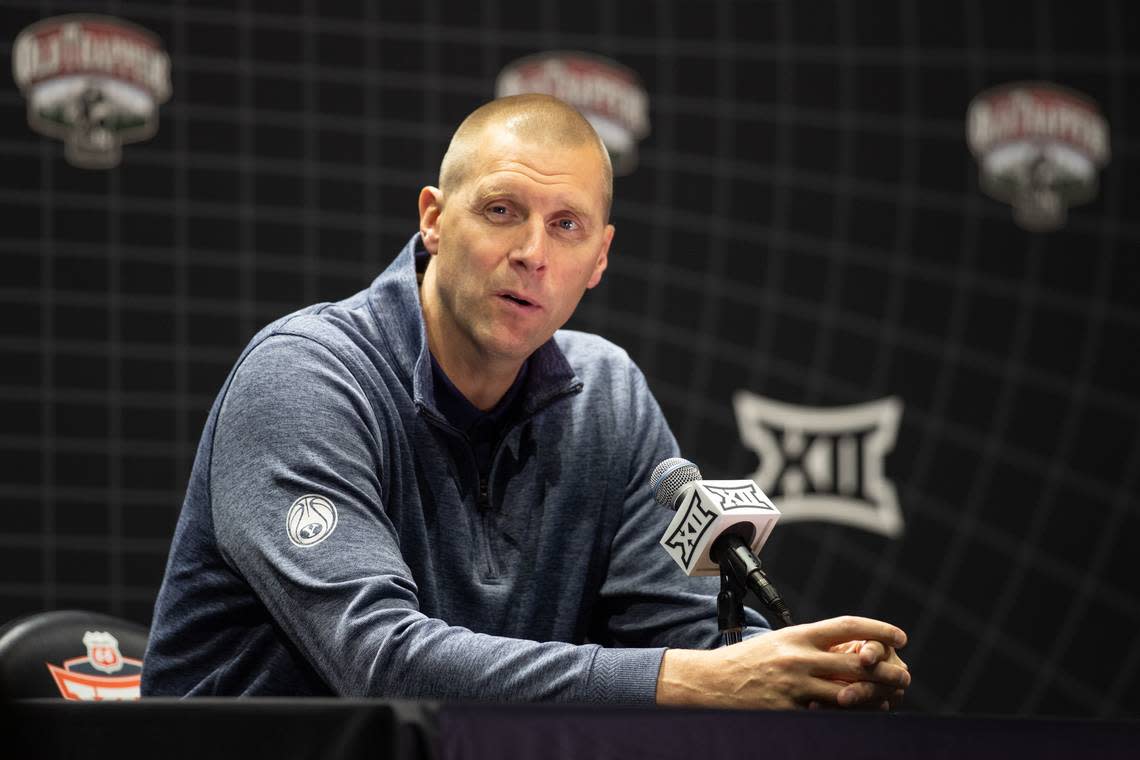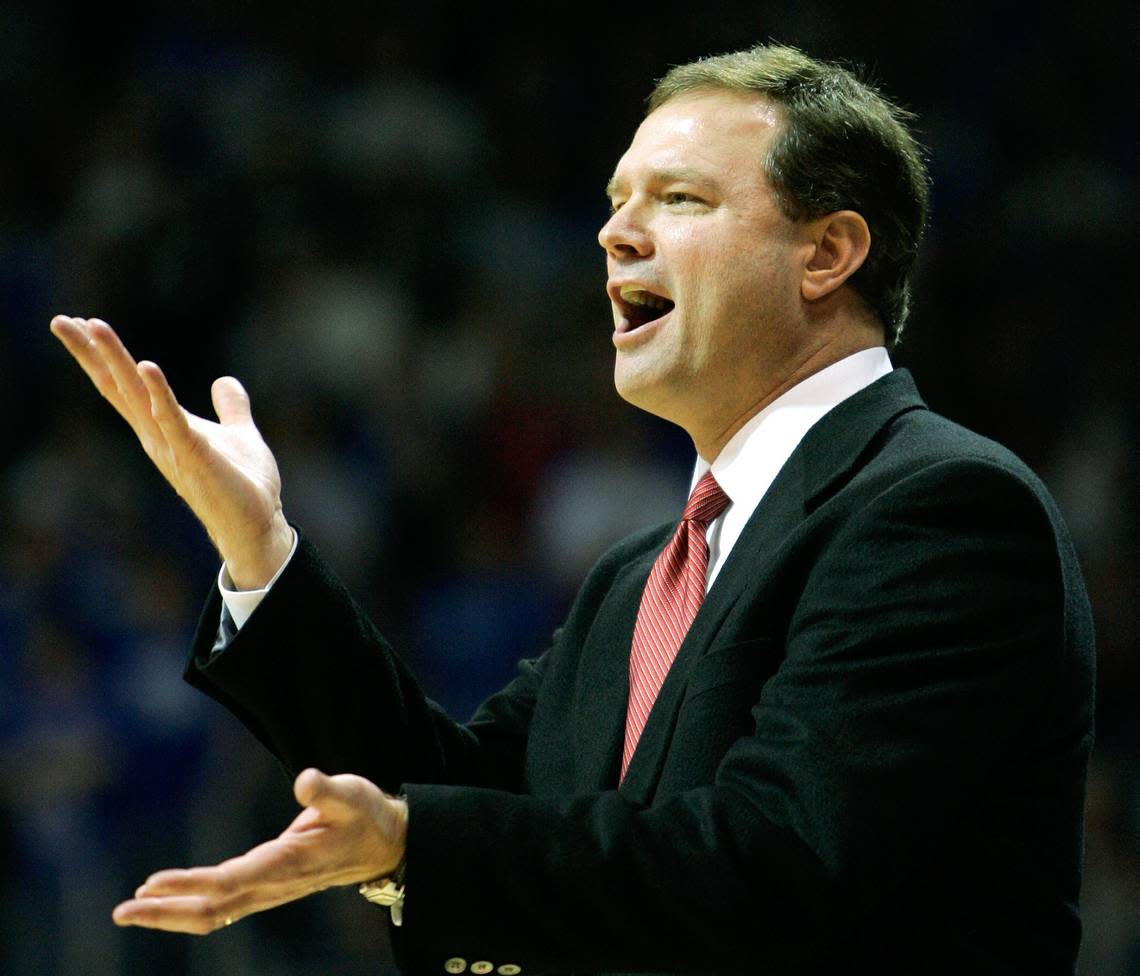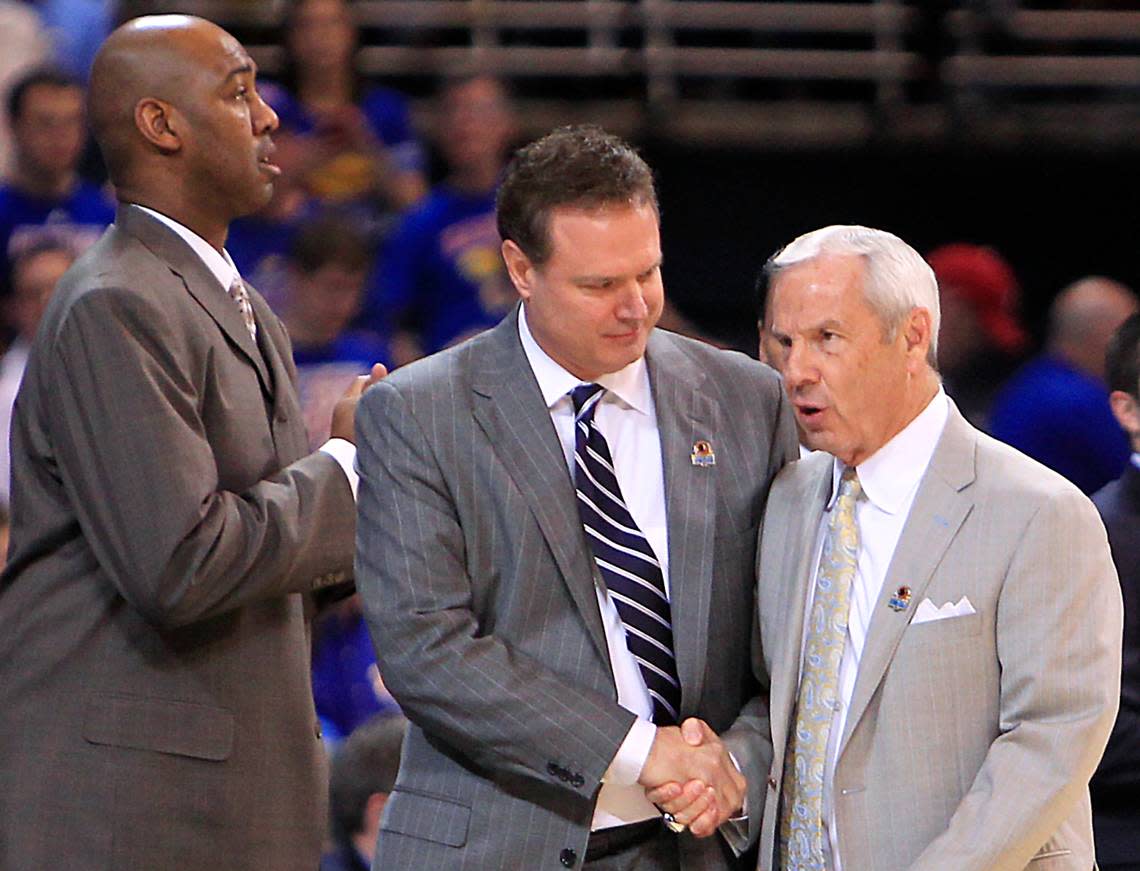How do you hire a blue-blood basketball coach? At Kansas or Kentucky ... move quickly
When a college men’s basketball blue-blood program — such as Kentucky this past week — has a rare head-coach opening, odds are the vacancy will be filled promptly.
Some recent examples …
• Hall of Famer Roy Williams stepped down as North Carolina coach on April 1, 2021. Former UNC player/Williams assistant Hubert Davis was named successor to the Tar Heel throne four days later.
• Mike Krzyzewski, winningest coach of all time, announced plans to depart Duke on June 2, 2021, after what would be a year-long farewell season. On the same day, it was revealed that former Blue Devil player and “Coach K” assistant Jon Scheyer would succeed the Hall of Famer/coaching legend.
• At Kansas, the last time the Jayhawks had such an opening was April 14, 2003, when Williams resigned his post after 15 seasons to take over at his alma mater, North Carolina.
His hiring at UNC came 13 days after Matt Doherty was removed as Tar Heels’ coach after just three seasons in Chapel Hill. Tradition-rich KU had a replacement for Williams in the fold in former Larry Brown graduate assistant Bill Self just five days later.
• Arkansas, which is not a blue blood, recently needed just six days to secure an agreement with John Calipari to replace Eric Musselman, the new coach at USC.
• Kentucky, which learned Tuesday it officially had a head hoops coach opening when Calipari finalized a five-year deal with the Razorbacks, announced Friday the hiring of former Wildcat forward Mark Pope to a five-year deal. Baylor’s Scott Drew rejected a job offer from UK athletic director Mitch Barnhart on Thursday morning, and the school wasted no time working out an agreement with Pope.
Find the right person ... now
No doubt successful coaching searches — especially in the day and age of increased player movement via the NCAA transfer portal — are the ones that end with the hiring of the correct fit ASAP.
“The most important thing is getting the right guy, but there is an element to that,” former KU associate athletic director Richard Konzem said in an interview with The Star this week, referring to a blue blood hiring a coach quickly.
Now retired after a successful stint as Rockhurst University golf coach and athletic director, Konzem was one of three individuals — associate AD Doug Vance and interim AD Drue Jennings were the other two — asked by KU chancellor Robert Hemenway to find a replacement for Williams 21 years ago.
“All kinds of people have huge interest — fans, media and other coaches,” Konzem said. “Social media adds an element to it. We didn’t have that when coach Williams left and coach Self was hired. Ours was more the area of talk radio. Now everything is instantaneous. The interest is significant with a lot of information out there.”
Players, recruits ‘wont wait’ long
Players and recruits of a school with a vacancy “are anxious. They want to know who their coach is,” Konzem said.
“In the past, if they lost their coach and transferred to another Div. I school they would have to sit out a year,” Konzem continued. “Now they are immediately eligible (at a new school).”
It’s imperative a new coach be brought in quickly so he can re-recruit players and convince them to remain in the program.
“The players want to know who the coach will be. If you don’t move fast, they won’t wait on you,” said former KU associate AD Vance.
And the portal has added a new element.
“Guys want to get settled,” Vance added of current players and incoming prospects. “It’s about keeping the roster intact, building the roster as best you can. It’s even more critical now. ... Kids can now leave through the portal, follow their coach and be eligible immediately.”
Vance spoke of a “changing environment in college basketball because of the portal and NIL.”
“In developing a roster, you can’t sit back and go through a long search process. I’m guessing Kentucky’s AD already had a list of people he’d pursue,” Vance said. “I think you’ve got to move quick. If you don’t, you will lose some opportunities for players.

“You are in scrambling mode. It was a little different when coach Williams left. There was no transfer portal. Still we did move pretty fast. We narrowed it down and interviewed about four people. It went fairly quick. The pressure is even greater to get it done today.”
Walking down memory lane regarding Self hiring
KU, which had its eyes fixed on Illinois coach Self as Williams’ potential replacement, conducted phone interviews with Self, Mark Turgeon, Ernie Kent and Tom Crean.
“Roy took the job Monday, and we had Bill (by) Sunday. It was urgent,” Konzem said of the process.
Konzem explained how KU was able to replace one Hall of Famer (Williams) with a future Hall of Famer (Self) in just a matter of days.

“We had a pretty good immediate target list. I had had a conversation with coach Self (while on the streets of New Orleans walking to dinner with family members) at the Final Four. I left that conversation knowing if coach Williams left (as rumored for UNC), Bill was very interested,” Konzem said.
“It immediately became clear Bill was the leading candidate. We had to get past their (Illini) banquet and award ceremony and the fact he was vacationing (after the banquet). That added a few days to it. Between Monday and Sunday we talked to many former players, many who played for coach Williams, many who played in the NBA at the time. We wanted their input: What kind of coach were they looking for? It’s a very busy time. You had coaches reaching out either directly or through a representative or agent. All of that is closely guarded. You don’t want to get put in situations where candidates back out because they can’t afford to have their name linked to it.”
Hush, hush during negotiations, interviews
Of the pursuit of Self, Vance said: “We kept it within our circle and made some quick decisions. At that time we had a pretty good idea who we wanted to go after and who was first on the list. It didn’t take a rocket scientist to figure out who that was. We didn’t know if Bill would take the job. But we went fast. We didn’t bring anybody in for an interview, all were done on the phone. That’s how fast we moved. We didn’t go through a long search process.”
On Friday, April 18, 2003, Jennings told chancellor Hemenway he believed Self was the man who should be offered the job.

“He had been here (working for Brown during the 1985-86 season) and he could smell Allen Fieldhouse kind of like a politician who goes to Washington and smells the Potomac,” Jennings told the Lawrence Journal-World in 2003. “I thought we should seize on that.”
Hemenway and Jennings called Self that Friday and offered him the job. Self accepted at 8 p.m. Saturday, the 19th. Self did not want to hold a news conference on Easter Sunday, thus the coach was introduced to the fans and media on Monday in Lawrence.
“Bill said, ‘I want to be a Jayhawk,’” Jennings said back in 2003. “He gave me the name of his attorney in Tulsa so we could begin talking about the contract.”
Roy’s hiring at KU revisited
It took a little bit longer, three weeks in fact, for KU athletic director Bob Frederick to name Williams as Larry Brown’s KU successor back in the summer of 1988. Brown resigned to take over as San Antonio Spurs coach on June 13, 1988. Williams was named KU coach on July 8.
“With Bill, he was the locomotive on the railroad track. Really early on he was identified as (the) No. 1 candidate. We knew there was some interest on his part. He’d been at Kansas. We’d competed against him in recent history in the NCAA Tournament. He’d been in the program and had been great about staying in touch. He was an obvious choice and candidate,” Konzem said

“That obviously went quicker. Back when coach Brown left there was no leading candidate. We had just won the national championship. We also knew we had a letter-of-inquiry from the NCAA and (AD) Bob Frederick was forthright and honest and told the coaches we were interviewing about the NCAA inquiry. He wasn’t going to bring someone in and two weeks later have that coach learn we were under investigation. You can imagine it caused some people to hesitate.”
Dean Smith offered KU job twice
Frederick first offered KU graduate/UNC coach Dean Smith the job. He politely declined.
Smith, who played basketball at KU, also had been offered the Jayhawk head coaching job by AD Monte Johnson after the firing of Ted Owens in 1983. Also, Charlie Spoonhour (SW Missouri State) and Gary Williams (Maryland) were interviewed for the opening caused by Brown’s departure to the NBA.
“Coach Smith said, ‘(I’m) flattered, but my name is on the building here. I don’t think I can leave,’” Vance recalled.
“That hiring (of Williams) took longer, but there were circumstances. The NCAA probe was underway. We knew there’d be penalties. That was impactful in the search process. Everybody knew it would potentially scare some people away, I think it did. Bob was going to take his time and get the right guy. It was a different time. The risk was not as great as far as your roster breaking down.”
How best to run a search?
Vance, who like Konzem was involved in the last two head men’s basketball coaching searches at KU, was asked his advice regarding coach searches.
“You have to narrow it down real quick. Probably this is the case at Kentucky,” Vance said. “You have to have a Plan A, B, C, have to figure out who the No. 1 choice is and go in that direction. It has to be kept low profile and quiet. I suspect Kentucky knows who they wanted and focused on that person until that person tells them no. In some respects you don’t have control of the time because of the negotiating part and reaching people.”
Konzem said KU has been fortunate to have had just eight men’s basketball coaches throughout history.
“I think this whole deal (with the Kentucky opening) is it points out it is very, very rare you can find coaches who last more than 8-10 years at a school. That’s why we’re so fortunate at Kansas,” Konzem said, “currently with Bill (21 years) and coach Williams (15 years). Before that with coach Brown (five years) and coach (Ted) Owens (19 years).
“We’ve had coaches who are able to last a long time. Kentucky, it seemed like both sides needed a fresh start for whatever reason after 15 years. Looking at their situation, we have to look at our situation and say how blessed we have been to have these coaches 15 years or more and still going strong with coach Self. We’re fortunate to have had him run the program and compete at the highest level, compete for championships every year.”
